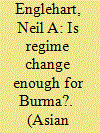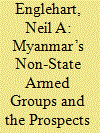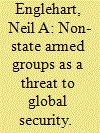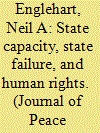|
|
|
Sort Order |
|
|
|
Items / Page
|
|
|
|
|
|
|
| Srl | Item |
| 1 |
ID:
066261


|
|
|
|
|
| Publication |
2005.
|
| Description |
p622-644
|
|
|
|
|
|
|
|
|
|
|
|
|
|
|
|
| 2 |
ID:
174814


|
|
|
|
|
| Summary/Abstract |
Myanmar has suffered the world’s longest civil war, with continuous combat since shortly before the country’s independence from the UK in 1948. A new National Ceasefire Agreement has raised hopes that peace may finally be in sight. However, optimism should be tempered by a recognition the peace process has not built much trust, reduced the number of non-state armed groups in the country, their total size, or significantly improved their human rights behavior. This is demonstrated through an analysis of original data on the major non-state armed groups active in Myanmar between 1985 and 2017. Peace will require hard political work leading to disarmament, restraining the military, and reassuring the country’s ethnic minority groups that their rights and interests will be respected even without the threat of insurgent violence.
|
|
|
|
|
|
|
|
|
|
|
|
|
|
|
|
| 3 |
ID:
145533


|
|
|
|
|
| Summary/Abstract |
What kind of security threats do non-state armed groups pose, and to whom? The literature has tended to take the state as a reference point for the study of non-state armed groups: insurgents have long been regarded as domestic military threats, and since 9/11, terrorism has been increasingly treated as a major transnational military threat. Because literature on armed non-state actors typically situates them in the context of war or protracted conflict, the state-centric and militarized view of these groups is rarely contested. However, data on 232 armed groups in twenty-three Asian countries from 1985 to 2014 show that the primary threat such groups most consistently pose is to the human security of local civilian populations, rather than the military security of states. A human security perspective suggests alternatives to military responses, the need for more tailored non-military interventions, and the necessity of improved data collection on non-state armed groups that exist in- and outside the context of conventional war.
|
|
|
|
|
|
|
|
|
|
|
|
|
|
|
|
| 4 |
ID:
087565


|
|
|
|
|
| Publication |
2009.
|
| Summary/Abstract |
While it is universally recognized that states are responsible for human rights conditions in their jurisdictions, it is less often noticed that this responsibility has two dimensions, one normative and one empirical. Normatively, most people agree that states ought to prevent human rights abuses. Empirically, however, states may not always be able to do so. In weak and failing states, agency loss and the inability to police effectively can lead to abuses by private individuals and rogue agents of the state. Thus, on balance, weak states typically have worse human rights records than strong ones. This is demonstrated by a global time-series cross-section analysis showing that indicators of state weakness - low tax revenues, corruption, and lack of law and order - all have a negative impact on human rights to personal security. The effect differs for different kinds of rights. Extrajudicial killings are highly sensitive to state capacity, while political imprisonment is more sensitive to democracy. Overall, however, it appears that the totalitarian model of human rights abuse by excessively strong states applies to a restricted set of cases. The more common problem is states that cannot effectively protect human rights. We must take state failure seriously when thinking about the causes of - and remedies for - human rights abuse
|
|
|
|
|
|
|
|
|
|
|
|
|
|
|
|
| 5 |
ID:
098865


|
|
|
|
|
| Publication |
2010.
|
| Summary/Abstract |
Afghanistan is often depicted as a failing state, but its failures display distinctive patterns over time and space. Regional variations in governance have been important in shaping the ways the Afghan state has failed and the consequences of these failures. This article argues that a history of better governance in the north facilitated the disarmament of militia warlords and comparative stability. By contrast, the south has a long history of minimal formal governance, creating opportunities for increased Taliban insurgency.
|
|
|
|
|
|
|
|
|
|
|
|
|
|
|
|
| 6 |
ID:
114648


|
|
|
|
|
| Publication |
2012.
|
| Summary/Abstract |
Burma's recent election was clearly not free and fair. However, it can also be seen as
improving a uniquely unrepresentative government, creating greater pluralism, and
institutionalizing differences within the ruling junta. Even the rigged election may
have created opportunities for further opening in the future.
|
|
|
|
|
|
|
|
|
|
|
|
|
|
|
|
|
|
|
|
|